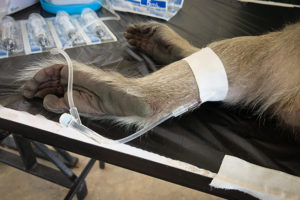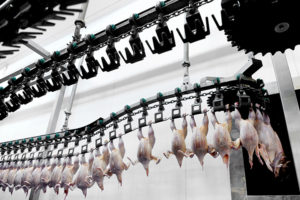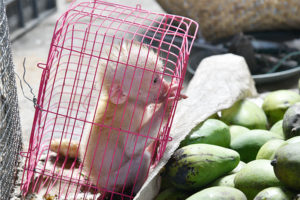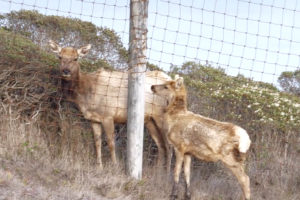The Fall Semester 2021 was as robust as ever for the Animal Law & Policy Clinic!
We received the excellent news that the motion to dismiss our case against the United States Department of Agriculture for failing to improve the Animal Welfare Act standard for the psychological well-being of primates used in research was denied. The government had moved to dismiss the case on the ground that the plaintiffs—Rise for Animals and the Animal Legal Defense Fund—lacked Article III standing.
 In a comprehensive ruling, Judge George Hazel of the federal district court for Maryland rejected the government’s arguments, explaining that “a[n organizational] plaintiff has suffered an organizational injury if the challenged policy or practice frustrates both [the organization’s] purpose and caused a drain on its resources.” He further ruled that the Plaintiff organizations met this test because of the “added burden of obtaining information about the treatment of nonhuman primates in research facilities due to the lack of informative reports under the current [challenged] rules,” and because “the current rules fail to properly educate stakeholders, including inspectors, about the psychological needs of nonhuman primates used in research and how to identify primates in distress, which has forced [plaintiffs] to fill the void created by the lack of clear standards.” This means the case will now proceed to the merits.
In a comprehensive ruling, Judge George Hazel of the federal district court for Maryland rejected the government’s arguments, explaining that “a[n organizational] plaintiff has suffered an organizational injury if the challenged policy or practice frustrates both [the organization’s] purpose and caused a drain on its resources.” He further ruled that the Plaintiff organizations met this test because of the “added burden of obtaining information about the treatment of nonhuman primates in research facilities due to the lack of informative reports under the current [challenged] rules,” and because “the current rules fail to properly educate stakeholders, including inspectors, about the psychological needs of nonhuman primates used in research and how to identify primates in distress, which has forced [plaintiffs] to fill the void created by the lack of clear standards.” This means the case will now proceed to the merits.
We also settled our related case against the USDA under the Freedom of Information Act in which we succeeded in uncovering the agency’s secret new Inspection Policy. Under this policy, the agency no longer fully inspects research facilities that are accredited by the industry-dominated trade association, the Association for the Assessment and Accreditation of Laboratory Animal Care (AAALAC). We not only obtained all of the information our clients sought, but also secured our first award of attorneys’ fees. The Secret Inspection Policy, and the Clinic’s role in uncovering it, was recently highlighted in Science Magazine.

The district court for the Western District of New York also ruled in our favor in a case challenging the USDA’s refusal to ban inhumane practices at the slaughterhouse, where more than 9 billion chickens and turkeys are killed each year for food in this country. Judge Charles Siragusa ruled that the Plaintiff organizations—the Animal Welfare Institute and Farm Sanctuary—had alleged sufficient Article III standing to proceed to the merits of the case, and that “[c]onsistent with the Supreme Court’s reasoning . . . [the agency’s] denial of Plaintiffs’ rule-making petitions was not an agency decision that has been precluded from judicial review as an action ‘committed to agency discretion’” under the Administrative Procedure Act. You can read about the decision on our website.
On behalf of both the Animal Law & Policy Clinic and Food Law Clinic, we submitted extensive comments in response to the USDA’s Advanced Notice of Proposed Rulemaking (ANPR) concerning whether it should impose labeling restrictions on cultivated meat products i.e. those made from the cells of animals. The aim of cultivated meat products is to eliminate the need to raise, keep, and maintain millions of live animals in inhumane conditions prior to being slaughtered for food. In the ANPR, which can be found here, the USDA explained that its need for comment was prompted by an earlier submission from the Animal Law & Policy Clinic that raised important First Amendment principles. Our recent comments responded to a list of questions posed by the agency, and stressed that not only are labeling restrictions for cultivated meat unwarranted at this time, and likely unconstitutional, but that if the agency nevertheless decides to go forward with labeling that differentiates between such products and their traditional counterparts, it should do so by requiring labeling of traditional meat products as “slaughtered meat” versus “cultivated meat.” A copy of our comments, drafted by Clinicians Liz Turner and Asha Ramakumar, can be found on our website.
 We also filed a Freedom of Information Act case in the district court for Arizona, on behalf of the Center for Biological Diversity, challenging the Fish and Wildlife Service’s (FWS) failure to disclose important data concerning the import and export of wildlife. As explained in our Complaint, that information—annually collected by the FWS and placed in its Law Enforcement Management Information System (LEMIS)—is vital to the Center and other organizations in their efforts to combat the billion-dollar black market in wildlife, and to assist the Center in identifying those species in need of greater protection under the Endangered Species Act and the Convention on International Trade in Endangered Species of Wild Fauna and Flora (CITES). Each year, the United States allows the import of millions of wildlife and plant specimens from around the world, including everything from python-skin boots, to parrots and turtles destined for the pet trade, to corals, orchids, and shells used for home decor, to lions killed as hunting “trophies,” as well as zoo and scientific specimens. The Complaint was drafted by Clinicians Caroline Graif and Ben Rankin.
We also filed a Freedom of Information Act case in the district court for Arizona, on behalf of the Center for Biological Diversity, challenging the Fish and Wildlife Service’s (FWS) failure to disclose important data concerning the import and export of wildlife. As explained in our Complaint, that information—annually collected by the FWS and placed in its Law Enforcement Management Information System (LEMIS)—is vital to the Center and other organizations in their efforts to combat the billion-dollar black market in wildlife, and to assist the Center in identifying those species in need of greater protection under the Endangered Species Act and the Convention on International Trade in Endangered Species of Wild Fauna and Flora (CITES). Each year, the United States allows the import of millions of wildlife and plant specimens from around the world, including everything from python-skin boots, to parrots and turtles destined for the pet trade, to corals, orchids, and shells used for home decor, to lions killed as hunting “trophies,” as well as zoo and scientific specimens. The Complaint was drafted by Clinicians Caroline Graif and Ben Rankin.
 We continued to litigate our case to save the Tule Elk who live at Tomales Point in Point Reyes National Seashore in Northern California, and filed our final reply brief in support of our motion for summary judgment. Our case, brought on behalf of several local residents and the Animal Legal Defense Fund, challenges the National Park Service’s “unreasonable delay” in revising the General Management Plan for this national park unit. The only GMP ever issued for this particular area was prepared in 1980, and the relevant statute requires the Park Service to revise all such Plans “in a timely manner.” Plaintiffs want the Park Service to revisit management of the elk, who over the last two years have lost half their population (224 elk out of 445) from starvation and dehydration because they cannot get past a 3-mile fence the Park Service maintains on the southern boundary of Tomales Point. The fence was erected to keep the native elk from competing for forage with livestock that the Park Service allows to graze south of the fence. The case is now fully briefed, and oral argument, which will be done by Clinic Fellow Kate Barnekow on behalf of the Plaintiffs, is scheduled for February 24, 2022 in Oakland California. A copy of our reply brief can be found on our website.
We continued to litigate our case to save the Tule Elk who live at Tomales Point in Point Reyes National Seashore in Northern California, and filed our final reply brief in support of our motion for summary judgment. Our case, brought on behalf of several local residents and the Animal Legal Defense Fund, challenges the National Park Service’s “unreasonable delay” in revising the General Management Plan for this national park unit. The only GMP ever issued for this particular area was prepared in 1980, and the relevant statute requires the Park Service to revise all such Plans “in a timely manner.” Plaintiffs want the Park Service to revisit management of the elk, who over the last two years have lost half their population (224 elk out of 445) from starvation and dehydration because they cannot get past a 3-mile fence the Park Service maintains on the southern boundary of Tomales Point. The fence was erected to keep the native elk from competing for forage with livestock that the Park Service allows to graze south of the fence. The case is now fully briefed, and oral argument, which will be done by Clinic Fellow Kate Barnekow on behalf of the Plaintiffs, is scheduled for February 24, 2022 in Oakland California. A copy of our reply brief can be found on our website.
The Clinic continued to work on several other Projects for the Good Food Institute, Center for Biological Diversity, Animal Legal Defense Fund, Rise for Animals, and others that remain confidential at this point.
It was an exciting and productive Semester. Once again, we could not undertake and accomplish all of this work without the unwavering support, assistance, and guidance of Kristen Stilt, Faculty Director, and Chris Green, Executive Director, of the Brooks McCormick Jr. Animal Law & Policy Program, our indispensable Communications Manager, Sarah Pickering, and all of our wonderful staff, colleagues, and clients.
Thank you all for a wonderful Semester – Onward and Upward!!
Katherine Meyer, Clinic Director

